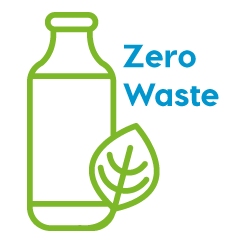7/6
Are Plant-Based Products Leading to More Trash?
As we’ve discussed, implementing solutions towards a circular economy is the most effective and impactful way to make the most of plant-based products. Not only is our planet facing a waste management issue, but even materials, especially plastics, designated as recyclable still stay in landfills or end up in our oceans. And at the end of the day, all petroleum-based products are still using a depleting reservoir of fossil fuels. Understanding what needs to change in order to make the most of plant-based products is a complicated issue – but we’ll address it in today’s blog.
If plant-based products aren’t disposed of properly, are we just creating more garbage?
Renewable Feedstocks



Plant-based products hold a wealth of opportunity for minimizing waste that goes to landfills, incinerators, or worse – the environment. We start with renewable feedstocks like algae, corn, bamboo, hemp, which are converted into materials like bio-based plastic resins or renewable chemicals. These plant-based materials can be used to build durable goods, like car parts and building materials, or other consumer materials like personal care products and cleaning supplies. Plant-based materials can also serve as more sustainable alternatives to traditional single-use items like packaging and foodservice ware.
Plant-based Plastics
Plant-based products offer an important solution towards minimizing the production – and subsequent waste associated with other materials. For example, some plant-based plastics can serve as equivalents for commonly recycled petroleum-based plastics like PET, fitting right into the recycling stream while coming from renewable feedstocks instead. Other plant-based plastics are compostable in commercial composting facilities, and when used as food packaging or food service items, they can support diversion of food waste to create compost. This helps keep food waste from contaminating the recycling stream and keeps more organic waste out of the landfill, reducing landfill volume and methane emissions.
Barriers for Compostable Products
But many barriers exist for compostable products. Composters are not always willing to take in these products for a number of reasons, including a lack of composting infrastructure and confusion with non-compostable plastics. In addition, consumers are confused by the term compostable, meaning products may be improperly disposed of (which we aim to address in future blog posts). PBPC and others are working to address these issues by clarifying misinformation and expanding composting infrastructure. To realize the full potential of compostable plant-based products, we must promote improvements in composting infrastructure while pursuing solutions to the varied challenges associated with ensuring proper disposal.
The environmental benefit of plant-based products and materials themselves cannot be overstated. Unlike materials derived from fossil fuels, feedstocks from plant-based materials remove CO2 from the atmosphere during their growing phase. If two-thirds of conventional plastics around the globe were replaced by plant-based alternatives, the reduction of emissions would be equivalent to the annual energy use of over 80 million homes.
Zero Waste Economy

Plant-based products can serve as a sustainable replacement to many petroleum-based materials and products. Implementing these products are one way to address our country’s growing waste management crisis and reduce emissions associated with landfills. At the same time, more work is needed to help move us toward a more circular, zero waste economy. Investing in new and better infrastructure that can support proper end-of-life procedures and ensuring that consumers are educated on how to properly dispose of these products are two ways to get started and fully embrace a circular economy.
